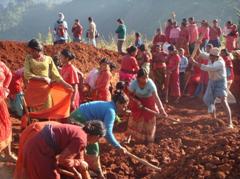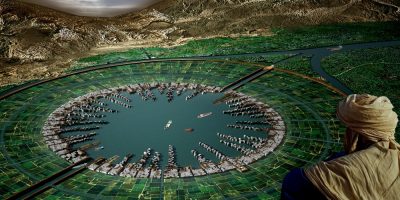 Despite this water fountain in Kurdistan, water there is scarce. This is not how poor Iraqis perceive their own shortages.
Despite this water fountain in Kurdistan, water there is scarce. This is not how poor Iraqis perceive their own shortages.
We have long suspected that in the coming years, as climate change and population expansion put pressure on natural resources, conflicts will arise. The ongoing Egyptian protests demonstrate how repressed rage eventually surfaces when autocrats rule and people are deprived of basic goods and services. It is also interesting how such suffering can skew perception. Iraqis living in the oil-rich Kirkuk province near Kurdistan believe that their Kurdish neighbors are maliciously depriving them of water via the Dukan Dam, though that is not the case. Water scarcity in the entire Middle East region is putting pressure on everyone, but already tense Sunnis seek to pin the blame. Sheikh Khaled al Mafraji told Al Arabiya that their Kurdish neighbors are closing off the dam valves during winter, which means that they do not have enough water to drink or for irrigation. UN figures show that of the 900,000 inhabitants of Kirkuk, 16% rely on agriculture.
They farm wheat and corn in the winter and sesame, tomatoes, and watermelon in the summer.
Sheikh Mafraji added that he was prepared to organize demonstrations if the situation doesn’t improve.
Cooler heads show a different perspective. One landowner describes how in 2005, peasants were forced to give up 1/3 of their land. They claimed that Kurds then exerted pressure through water deprivation.
In Abdul Rahman al-Obeidi’s view, officials in Baghdad and the Sulaimaniyah province are not doing enough to avert what is a potential crisis.
At present, the region is receiving half of its usual annual rainfall. And the dam, which currently holds 1.3 million cubic meters of water, is dangerously low. Of that amount, only 600,000 may be used, since the rest is being held as an emergency reserve.
And the dam on the lesser Zab river has been closed every year during winter in order to preserve water for spring farming.
Tahseen Kader is the former Minister of water resources for the Kurdistan government. Given that many of Kirkuk’s residents are in fact Kurdish, he suggests it is absurd to suggest that they would deliberately harm their neighbors.
With a long history of ethnic tensions between Kurds and Iraqis, both governments would do well to arrest this problem before it gets out of control.
:: Al Arabiya
More on water shortages in the Middle East:
Yemen’s Water Shortage Could Worsen Security
In The Face Of Nile-lessness, Egyptians Protest Water Shortages
Thailand To Help Jordan Make Artificial Rain
image via martijn.munneke



